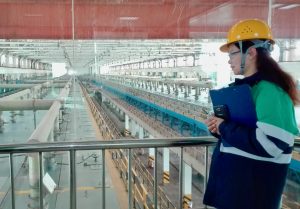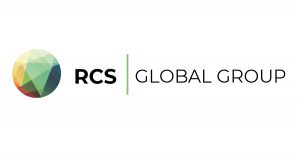Automotive responsible sourcing: an interview with RCS Global Group
June 2020. The last 18 months have seen a significant increase in engagement in responsible sourcing from automotive companies and RCS Global is playing a major role in the sector’s evolving approach.
In our latest industry blog, we speak to our Managing Director, and our Head of Advisory, Knowledge and Training to get their views on the latest trends from a downstream and upstream perspective.
 Alice Valvodova, Head of Advisory, Knowledge, and Training
Alice Valvodova, Head of Advisory, Knowledge, and Training
Public attention on responsible sourcing is firmly focused on the mobility sector and the electric vehicle (EV) transition. What has been your experience of this trend?
We have certainly seen a real increase in engagement from the automotive sector. This has been down to the massive repositioning of the sector towards EV production and the supply chain challenges this brings with it, starting with a lack of knowledge and transparency in those supply chains.
While several of the auto companies we work with have now developed, and are implementing, strong responsible due diligence programs and management systems, a lot of the sector is still really at the beginning of the responsible sourcing journey and is still to implement robust systems to manage due diligence.
How do you see responsible sourcing in the auto space evolving?

The sector overall is at quite an early stage, but the auto sector is fortunate in that a lot of the groundwork has already been done by other industries. As with the electronics sector before them, the auto sector is starting to follow the model set out in the OECD Due Diligence Guidance for Responsible Mineral Supply Chains – the key globally recognised framework for responsible mineral sourcing.
Also, what we have seen is that through the process of developing a strong due diligence process for one high risk material, such as cobalt, there has been a realisation that a similar approach should be applied across a range of other supply chains. This is a really positive trend and one which has also been suggested by the European Parliament Working Group on Responsible Business Conduct.
However, given that companies need to prioritise their resources, cascading due diligence requirements down a broad range of supply chains feeding into the production of a car is a huge process spanning from cobalt, mica, to copper, to rubber and even agricultural commodities like peanut shells.
Auto companies must therefore balance their available resources against the materiality of the raw materials they use from the perspective of importance to responsible sourcing and influence on business success. Our leading clients have already done this, for example, conducting a priorisation of a selection of raw materials for their initial work.
Do you see significant developments in terms of legal requirements?
A lot of attention is being focused on the EU Conflict Mineral Regulation, which is applicable to EU importers of tin, tantalum, tungsten, and gold. Although the regulation currently doesn’t apply to downstream end users of minerals, there is an expectation on downstream end users to voluntarily demonstrate and report on their due diligence practices. A recent report on due diligence has led to the EU DG Justice supporting mandatory human rights due diligence in supply chains. We certainly anticipate a strengthening focus from regulators, globally.
It is important to remember that downstream companies are already impacted through national legislation mandating supply chain due diligence on particular issues (for example, modern slavery in the form of the UK Modern Slavery Act, and human rights, corruption and environmental risks through France’s Duty of Vigilance Law). Isolated law suits in the child labour context have also come up.
So, in Europe at least, the trend is clear and we believe this anticipated increase in hard law on supply chain due diligence will also influence the wider market both in the US and Asia.
In your experience, would you say that the auto industry approach is consistent or are company level approaches still varied when it comes to managing responsible sourcing risks? Also, are there any best practice leaders emerging in the sector?
Leading auto companies are moving individually or collectively (with other OEMs or their respective supply chain partners) towards following global good practice as defined by the OECD Due Diligence Guidance and OECD aligned good practice standards, alongside the mandatory legislative frameworks.
However, there are outliers. There are examples of individual automotive brands which have either simply not proactively engaged on the issue yet or have decided to take assertive positions on high-risk commodities such as cobalt, claiming that they will disengage from high-risk production regions. This is a risky approach as market expectations are now very much focused on brands taking (and demonstrating) action and there is general consensus that minerals mining is essential for local livelihoods in producer countries.
With such vast and complex supply chains, it is also immensely difficult for a single auto company to defend any claims made about not sourcing from a specific jurisdiction. Certainly, from our understanding of the cobalt supply chain, we believe such claims would not hold up to significant scrutiny.
How about action at industry levels?
There are signs of industry coordination, but this is made more complex through a fragmentation of initiatives, which can also slow down implementation.
The Responsible Minerals Initiative is expanding its work program to cover more battery industry relevant raw materials, while the CSR Europe branch of Drive Sustainability has developed an analysis of the responsible sourcing risks across auto supply chains.
At the same time, multi-stakeholder groupings, like the Global Battery Alliance, are also developing work programs, adopting principles and roadmaps to create sustainable battery value chains on a macro industry level. Notwithstanding, collective efforts cannot replace the individual responsibility of companies for responsible sourcing.
RCS Global is a contributor, member or participant in most forums and groupings and what we see as our advantage is that we work across all tiers of the supply chain every day. Responsible sourcing is really a supply chain issue, which means it requires solutions that are based on an understanding of the needs and perspectives – and are developed with the support of organisations at all tiers of the supply.
…the view from the upstream
 Ferdinand Maubrey, Managing Director
Ferdinand Maubrey, Managing Director
How has the steep rise in auto engagement impacted upstream efforts in responsible sourcing?
There has certainly been a marked increase in car companies directly supporting initiatives aimed at improving conditions in production countries. For example, our Better Mining program monitors and directs continuous improvement of artisanal and small-scale mine (ASM) sites, which is operational across the Democratic Republic of the Congo (DRC) and Rwanda, is supported by Volvo Cars and as well as the Responsible Minerals Initiative, alongside key midstream companies.
Also, almost all mobility companies that actually engage in responsible sourcing in the battery space use our supplier audit programs to identify and engage directly with upstream producers, something that previously would have been rare. This, again, is a positive trend. Auto brands have huge leverage given the significant amounts of cobalt and other battery materials they use and will use relative to other sectors. By engaging directly, they are helping to speed up improvements in mining conditions in the upstream.
What are the key challenges the sector faces in its upstream engagement?
One area where we still see a lot of confusion and ambiguity is in the industry’s approach to ASM, despite most global companies having a significant, known and accepted presence of ASM mined 3TG material in their products. This is particularly the case for artisanally mined cobalt, which is often mined alongside copper. A huge part of global production stems from the number one exporter, the DRC. RCS Global is playing a significant role in ASM assurance through the Better Sourcing Program and the Better Mining partnership with the RMI.
Some brands still try to disengage from ASM but they struggle with the fact that ASM is difficult to ‘remove’ from supply chains due to the supply chain structure. Of course, ASM also remains an important source for cobalt supply (even acting as a swing producer during supply shortages) and provider of livelihoods for millions of people in producer countries. International responsible sourcing standards recommend the opposite of ‘removal’ and disengagement. They want to see engagement for continuous improvement – this is the only pathway to make ASM material more responsible and more broadly acceptable to the market.

An often-repeated excuse to not engage in ASM cobalt supply chains is that no responsible ASM standards exist. But this is incorrect! The CRAFT Code can be applied to cobalt, the RMI Pilot Cobalt Refiner Standard includes appendices on how ASM can be integrated in international supply chains, and there are industry working groups agreeing on responsible cobalt ASM. In 3TG, of course, where ASM is readily accepted in global supply chains, the core standard is the OECD Due Diligence Guidance.
There needs to be a firm commitment from companies to support the reform and improvement of ASM through the backing of sector wide improvement initiatives and commitments. This will have a massive benefit for the millions of workers who depend on ASM for a livelihood and for customers who can purchase more responsible products to help support the battery revolution.
How is the auto sector specifically responding to the innovation opportunity?
The automotive sector has a really valuable role to play as a driver of technological innovation in responsible sourcing. As businesses that are used to relying on data analysis for business decisions, auto companies are looking at ways to integrate more quantitative and qualitative supply chain data more effectively. Secondly, the sector is interested in seeing whether product traceability is possible and economically feasible, so that they can deliver a reliable, robust digital trail which proves their inputs have been produced responsibly.
And finally, from a capacity perspective, auto OEMs are large enough to be able to afford to back a wide range of potentially disruptive and innovative supply chain solutions with the knowledge that some will ultimately prevail over others. This capacity means that there is a lot of willingness in the sector to support innovation in responsible sourcing, something we think is a good thing.
And finally, do you have any other areas you’d like to address?
Alice Valvodova:
As coronavirus continues to impact companies in the minerals value chain, the pandemic demonstrates the need for supply chain transparency more than ever. Only by understanding their supply chains can companies ensure security of supply from a business perspective and appropriate risk identification and risk mitigation from a responsible sourcing perspective. Regardless of the current situation, serious human rights abuses like child labour are unacceptable and companies should be working proactively to identify and mitigate such risks.
It is also high time for the industry to move away from a risk mitigation perspective to opportunity creation such that responsible sourcing is not an add-on/nice-to-have but rather an integral part of a company’s strategy to create business value. To do that upstream companies should quantify the commercial value of responsible produced minerals (e.g. market access, customer confidence), while downstream companies should try to quantify the business value of sourcing responsible produced minerals (e.g. security of supply, risk reduction etc.).
Ferdinand Maubrey:
I would completely agree with Alice’s point here. Furthermore, while coronavirus is a massive health and economic challenge, it will likely not have a structural impact on supply chains in the long-term. However, responsible sourcing cannot be momentary, it must be a process of continuous improvement in order to properly impact the lives of mining communities.
